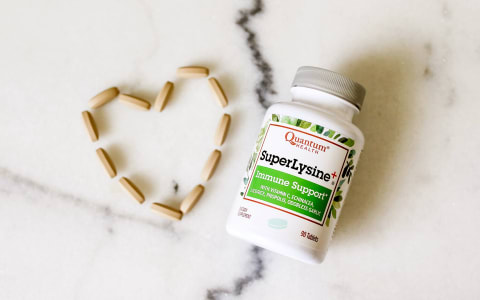Advertisement

Let's talk about the "H" word: herpes. Did you know that it's way more common than you think? In fact, judging by the World Health Organization's findings that 3.7 billion people worldwide under the age of 50 have herpes simplex type 1, or HSV-1, chances are that many people you know have the virus. That's roughly 67 percent of the world's population in that age group, after all.
But even with that degree of prevalence, there are still so many misconceptions about both strains of the herpes simplex virus, and it's high time we debunked them and set the record straight. Here are four common herpes myths, explained:
Myth: Herpes is one virus.
Thought all herpes referred to the same garden-variety virus? Think again: Type 1 of the herpes simplex virus (HSV-1) is, in fact, not the same virus as the one commonly referred to as genital herpes. That one is herpes simplex type 2, or HSV-2, and it affects roughly 12 percent of people ages 14 to 49, according to the Centers for Disease Control and Prevention's National Center for Health Statistics1. So the HSV-1 virus, which is the one that causes cold sores, isn't an indicator of issues...downstairs.
Myth: There's nothing you can do to treat HSV-1.
This doesn't mean that herpes isn't contagious, as both strains very much are; it just means you have to be especially diligent in managing it when sores or outward signs present themselves. (For the record, it's possible to spread HSV-1 even when you don't have symptoms of a cold sore.)

In the case of cold sores, an over-the-counter treatment that contains L-lysine, an antiviral amino acid that helps the body produce things like antibodies and protein hormones, is a great choice. If you're prone to getting cold sores, Super Lysine+ tablets are a preventive option that also gives you an extra immune boost with ingredients like vitamin C, echinacea, garlic root, propolis, and licorice root. If you need to treat an outbreak, the herbal Super Lysine+ Ointment can help cut healing time in half. Taking its active ingredient L-lysine may be helpful in decreasing L-arginine, which is the amino acid that's needed to replicate the herpes simplex virus.
Myth: Cold sores and canker sores are the same thing.
Canker sores usually show up inside your mouth—and are super painful—while cold sores tend to present themselves on the vermilion border, our outside edge of the mouth. Eventually they rupture, and as they heal, they crust over and cause the yellowish appearance commonly associated with cold sores.
A canker sore can more commonly be identified as an ulcer, while a cold sore is a blister; however, both go away eventually. One thing you might not have realized about cold sores, though? The HSV-1 virus lives in the trigeminal ganglion, which is a nerve found right behind your cheekbone. So if you have a pesky cold sore, it can even cause pain much farther up your face. Not a fun side effect, to say the least.
Myth: Having HSV-1 is something to be embarrassed about.
Nearly 4 billion people carrying the same HSV-1 virus means that if you have it, you're definitely not alone, nor should you feel stigmatized by it. Most HSV-1 infections are acquired during childhood; however, it is a lifelong condition. The good news? Most herpes infections are also asymptomatic, meaning that they don't show any outward signs unless in a flare-up.
The most important thing is to consult your doctor if you feel you might have the herpes virus so that you can take on an informed approach to treating it. And lastly? Feeling self-conscious about it is unnecessary. Just ask the other 48 percent of the population!
